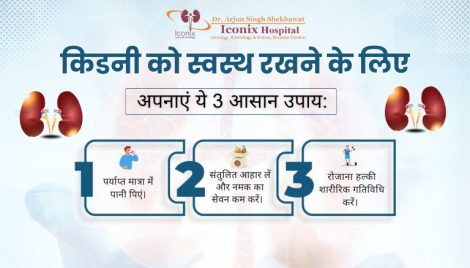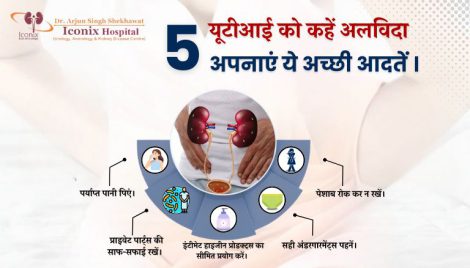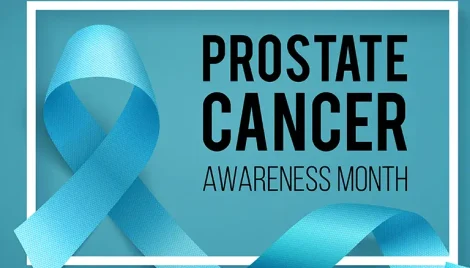
- Home
- About
- Treatments

किडनी को स्वस्थ रखने के लिए अपनाएं ये ज़रूरी उपाय
 September 8, 2025
September 8, 2025 परिचय
किडनी (गुर्दे) हमारे शरीर का सबसे अहम हिस्सा है। इसे अक्सर “बॉडी का फ़िल्टर सिस्टम” कहा जाता है क्योंकि किडनी खून से विषैले पदार्थ (toxins), अतिरिक्त पानी और अपशिष्ट पदार्थ (waste products) को बाहर निकालकर शरीर को स्वस्थ रखती है।
लेकिन आजकल की अनहेल्दी लाइफस्टाइल, खराब खान-पान, कम पानी पीना, जंक फूड और तनावपूर्ण दिनचर्या के कारण किडनी डिज़ीज़, स्टोन, हाई ब्लड प्रेशर, डायबिटीज और यूरिन इंफेक्शन जैसी समस्याएं तेजी से बढ़ रही हैं।
एक अनुभवी यूरोलॉजिस्ट और एंड्रोलॉजिस्ट के रूप में, मैंने हजारों मरीजों का इलाज किया है। मेरा अनुभव कहता है कि सही देखभाल और जीवनशैली में बदलाव से आप लंबे समय तक किडनी को स्वस्थ रख सकते हैं और गंभीर बीमारियों से बच सकते हैं।
किडनी का महत्व और कार्य
किडनी हमारे शरीर के लिए कितनी महत्वपूर्ण है, यह समझना जरूरी है।
- खून की सफाई – किडनी खून से विषैले और हानिकारक पदार्थ बाहर निकालती है।
- पानी और खनिज संतुलन – सोडियम, पोटैशियम और कैल्शियम का संतुलन बनाए रखती है।
- ब्लड प्रेशर कंट्रोल – रेनिन नामक हार्मोन का उत्पादन करके रक्तचाप नियंत्रित करती है।
- रेड ब्लड सेल्स (RBC) का निर्माण – एरिथ्रोपोइटिन हार्मोन बनाकर RBC बनाने में मदद करती है।
- हड्डियों की मजबूती – विटामिन D को सक्रिय कर हड्डियों को मजबूत बनाती है।
किडनी को नुकसान पहुँचाने वाली आदतें
कई बार हम अनजाने में ऐसी गलतियां करते हैं जो धीरे-धीरे किडनी को नुकसान पहुंचाती हैं:
- कम पानी पीना
- ज्यादा नमक और प्रोसेस्ड फूड खाना
- बार-बार पेनकिलर लेना
- धूम्रपान और शराब का सेवन
- अनियंत्रित डायबिटीज और ब्लड प्रेशर
- जंक फूड और कोल्ड ड्रिंक का ज्यादा सेवन
- लंबे समय तक पेशाब रोकना
किडनी को स्वस्थ रखने के लिए 7 ज़रूरी टिप्स
1. पर्याप्त मात्रा में पानी पिएं 💧
- दिनभर में 8–10 गिलास पानी पिएं।
- पानी शरीर से टॉक्सिन्स निकालता है और स्टोन बनने से रोकता है।
- नींबू पानी, नारियल पानी और छाछ भी लाभकारी हैं।
2. नमक और प्रोसेस्ड फूड कम करें 🧂
- ज्यादा नमक खाने से किडनी पर दबाव बढ़ता है।
- पैकेज्ड स्नैक्स, चिप्स और प्रोसेस्ड मीट से बचें।
3. हेल्दी डाइट अपनाएं 🥦
- हरी सब्जियां, ताजे फल, कम वसा वाले प्रोटीन और फाइबर युक्त भोजन करें।
- ज्यादा तैलीय और मीठे भोजन से बचें।
4. ब्लड शुगर और ब्लड प्रेशर कंट्रोल रखें 🩸
- डायबिटीज और हाई BP किडनी को सबसे ज्यादा नुकसान पहुंचाते हैं।
- नियमित जांच करवाएं और डॉक्टर द्वारा बताई गई दवाएं समय पर लें।
5. धूम्रपान और शराब से बचें 🚭
- ये दोनों किडनी की कार्यक्षमता को धीरे-धीरे कम कर देते हैं।
- स्मोकिंग छोड़ने से दिल और किडनी दोनों सुरक्षित रहते हैं।
6. नियमित व्यायाम करें 🧘
- वॉकिंग, योग और हल्के व्यायाम को अपनी दिनचर्या में शामिल करें।
- मोटापा किडनी रोगों का बड़ा कारण है, इसलिए वजन नियंत्रित रखें।
7. दर्द निवारक दवाओं का सीमित उपयोग करें 💊
- ज्यादा पेनकिलर लेने से किडनी पर बुरा असर पड़ सकता है।
- बिना डॉक्टर की सलाह के दवाएं न लें।
🚨 कब करें डॉक्टर से संपर्क?
अगर आपको निम्न लक्षण दिखाई दें तो तुरंत यूरोलॉजिस्ट से संपर्क करें:
- पेशाब में जलन या खून आना
- बार-बार पेशाब आना या बहुत कम आना
- शरीर में सूजन (पैर, चेहरे या आंखों के पास)
- लगातार थकान और कमजोरी
- बार-बार किडनी स्टोन या पेशाब की तकलीफ
👉 समय पर जांच और सही इलाज से किडनी रोगों को गंभीर होने से रोका जा सकता है।
किडनी रोगों से बचाव के घरेलू नुस्खे
- तुलसी का रस – रोजाना 1 चम्मच तुलसी रस किडनी स्टोन में फायदेमंद।
- नींबू पानी – इसमें साइट्रेट होता है, जो स्टोन बनने से रोकता है।
- नारियल पानी – यूरिन साफ करता है और डिटॉक्स करता है।
- अनार का रस – एंटीऑक्सीडेंट से भरपूर, किडनी हेल्थ को बेहतर करता है।
डॉ. अर्जुन सिंह शेखावत – किडनी रोग विशेषज्ञ, जयपुर
- गोल्ड मेडलिस्ट यूरोलॉजिस्ट और एंड्रोलॉजिस्ट
- विशेषज्ञता:
- लेज़र सर्जरी (HOLEP, RIRS)
- किडनी ट्रांसप्लांट
- एंडोस्कोपिक प्रक्रियाएं
- पुरुष स्वास्थ्य एवं एंड्रोलॉजी
- 8+ वर्षों का अनुभव और हजारों मरीजों का सफल इलाज
- लोकेशन: वैषाली नगर, जयपुर
FAQs (अक्सर पूछे जाने वाले प्रश्न)
Q1. किडनी को हेल्दी रखने के लिए कितना पानी पीना चाहिए?
👉 कम से कम 8–10 गिलास पानी रोज पीना चाहिए।Q2. क्या जंक फूड किडनी को नुकसान पहुंचाता है?
👉 हाँ, जंक फूड और ज्यादा नमक किडनी रोगों का खतरा बढ़ाते हैं।Q3. क्या किडनी स्टोन बार-बार हो सकता है?
👉 अगर जीवनशैली और डाइट का ध्यान न रखा जाए तो स्टोन दोबारा बन सकता है।Q4. किडनी रोग का शुरुआती लक्षण क्या होता है?
👉 पेशाब में जलन, बार-बार पेशाब आना या शरीर में सूजन शुरुआती लक्षण हो सकते हैं।Q5. क्या किडनी रोग का इलाज संभव है?
👉 हाँ, समय पर जांच और सही इलाज से किडनी को लंबे समय तक स्वस्थ रखा जा सकता है।Related Blogs
-
 September 23, 2025
September 23, 2025 -
 September 9, 2025
September 9, 2025

-
D 9/90-Opposite Swaminarayan mandir gate no-1, Chitrakoot, Vaishali Nagar, Jaipur, Rajasthan 302021.
-
Customer Support
+91 82398 88451 -
Drop Us an Email
info@drarjunsinghshekhawat.com
Quick Links
Treatments
Policies

© 2025 Dr. Arjun Singh Shekhawat, All Rights Reserved.


